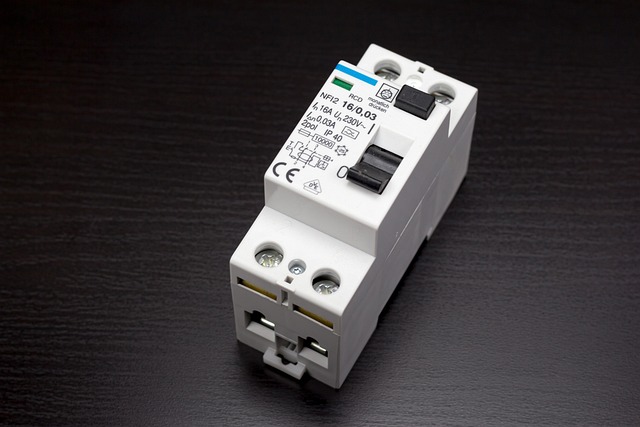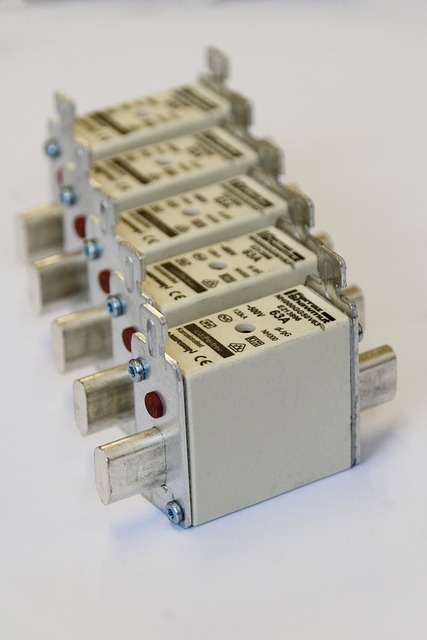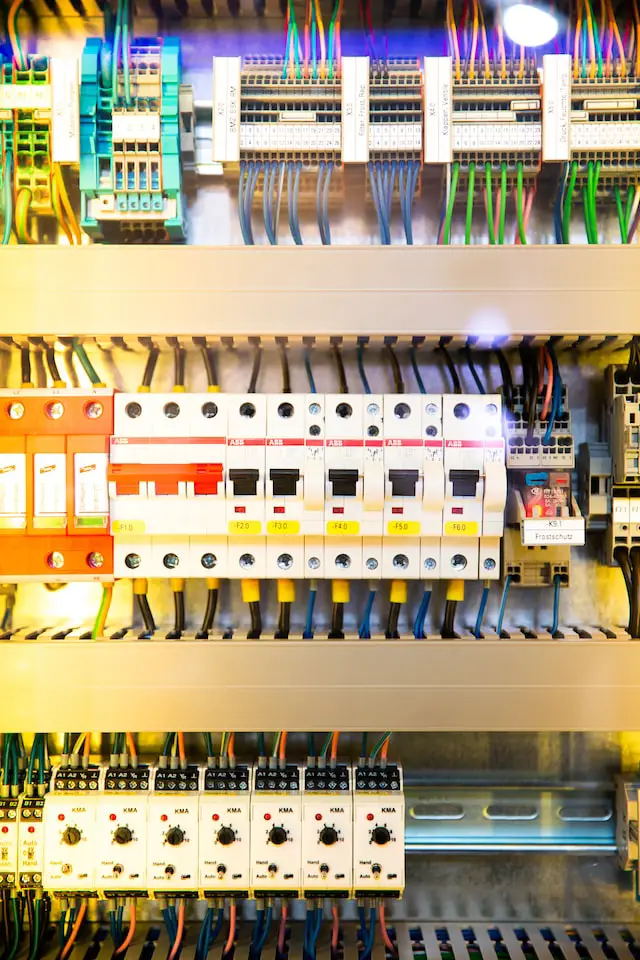A fuse is a piece of wire that melts when too much current flows through it, breaking the circuit and stopping the flow of electricity. A circuit breaker, on the other hand, is a switch that can be turned off and on. When too much current flows through a circuit breaker, it trips the switch and breaks the circuit.
Circuit breakers
(Image by Jürgen Diermaier from Pixabay)

Circuit breakers are electrical switches designed to protect electrical circuits from damage caused by excessive current flow. They are essential safety devices used in residential, commercial, and industrial settings. When a circuit experiences an overload or a short circuit, the circuit breaker automatically trips or opens the circuit, interrupting the flow of electricity.
Here are the key features and functions of circuit breakers:
Overload Protection: Circuit breakers are designed to handle a specific amount of current. If the current exceeds the breaker’s rated capacity due to an overload (e.g., too many appliances on a single circuit), the breaker trips and interrupts the circuit, preventing overheating and potential fires.
Short Circuit Protection: A short circuit occurs when a hot wire comes into contact with a neutral wire or a ground wire. Circuit breakers quickly detect the abnormal surge in current and trip to isolate the circuit, preventing damage to the wiring and devices.
Resettable: Unlike fuses (which require replacement after tripping), circuit breakers can be easily reset. After identifying and addressing the cause of the overload or short circuit, the breaker can be manually switched back on, restoring the flow of electricity.
Different Types: Circuit breakers come in various types to suit different applications. Some common types include thermal-magnetic, ground fault circuit interrupters (GFCIs) for protection against electrical shocks in wet areas, and arc fault circuit interrupters (AFCIs) to prevent electrical fires caused by arc faults.
- Thermal-magnetic circuit breakers are the most common type of breaker used in residential and light commercial applications. They combine both magnetic and thermal effects to provide protection against both types of faults.
- Solid-state circuit breakers use semiconductor devices to detect faults and provide protection. They are typically used in medium-voltage applications such as distribution systems.
- Air-blast circuit breakers use high-pressure air to extinguish arcs when interrupting current flow. These types of breakers are typically used in high-voltage applications such as transmission systems.
Circuit Monitoring: Advanced circuit breakers can provide additional features such as monitoring and reporting electrical data. These smart breakers can detect abnormal conditions, track power usage, and even integrate with home automation systems for enhanced control and safety.
Safety Standards: Circuit breakers must meet specific safety standards to ensure reliable operation. They are rigorously tested for performance, durability, and the ability to interrupt current flow under various conditions.
Circuit breakers are electrical safety devices that protect circuits from overloads and short circuits. They automatically trip when abnormal currents are detected, preventing damage to the wiring, devices, and potential hazards like fires. Their resettable nature and availability in different types make them crucial components in maintaining electrical safety in homes, businesses, and industries.
Fuses
(Image by Bruno /Germany from Pixabay)

Fuses are protective devices used in electrical circuits to prevent excessive current flow and protect against damage caused by overloads or short circuits. They are designed to act as sacrificial components that will melt or blow when subjected to high currents, thereby breaking the circuit and interrupting the flow of electricity.
Here are the key features and functions of fuses:
Construction: Fuses typically consist of a metal strip or wire, often made of materials like copper, aluminum, or silver, which is enclosed within a protective housing. The metal strip is designed to have a lower melting point than the wires and components in the circuit. When excessive current passes through the fuse, it heats up the metal strip, eventually causing it to melt or blow.
Current Protection: Fuses are rated for specific current levels. If the current flowing through the circuit exceeds the fuse’s rated capacity, the metal strip inside the fuse will melt or blow, effectively opening the circuit and cutting off the flow of electricity. This action protects the circuit and connected devices from damage due to excessive currents.
Non-Resettable: Unlike circuit breakers, fuses are non-resettable devices. Once a fuse blows or melts, it needs to be replaced with a new one to restore electrical continuity. This replacement is necessary because the original fuse element is no longer intact or functional.
Types of Fuses: Fuses come in various types and sizes to suit different applications. Some common types include glass tube fuses, cartridge fuses, and blade fuses. Different fuses have different form factors, current ratings, and voltage ratings, making it important to choose the appropriate fuse for a specific circuit.
Overload and Short Circuit Protection: Fuses are designed to protect against both overloads and short circuits. In the case of an overload, where the current exceeds the fuse’s rating, the fuse will melt or blow. Similarly, in a short circuit, where a low-resistance path is created, causing a massive surge of current, the fuse will quickly interrupt the circuit.
Safety Standards: Fuses are manufactured to meet safety standards and regulations to ensure their reliability and performance. These standards dictate aspects such as current ratings, voltage ratings, and interrupting capacities, ensuring fuses provide effective protection in various electrical systems.
Fuses have been widely used for many years and continue to play a vital role in electrical safety. However, advancements in technology have led to the increasing use of circuit breakers in many applications due to their resettable nature. Nonetheless, fuses are still commonly used in specific applications where their unique features and characteristics make them the preferred choice for circuit protection.
Advantages of a circuit breaker over a fuse
Circuit breakers offer several advantages over fuses when it comes to circuit protection. Here are some key advantages:
Resettable: One of the primary advantages of circuit breakers is their resettable nature. After tripping due to an overload or short circuit, circuit breakers can be easily reset by switching them back on. This eliminates the need for replacement and reduces downtime, saving time and costs compared to fuses, which need to be replaced once they blow.
Convenience: The ability to reset circuit breakers makes them more convenient to use. In the event of a trip, users can quickly identify and address the cause of the problem, reset the breaker, and restore power without the need to locate and install a new fuse.
Cost Savings: Circuit breakers can offer long-term cost savings. While their initial purchase cost may be higher than fuses, the fact that they can be reused eliminates the need for frequent replacements. This reduces ongoing expenses associated with replacing blown fuses and ensures a more cost-effective solution over time.
Improved Safety: Circuit breakers provide enhanced safety features compared to fuses. They have built-in mechanisms for detecting and responding to overloads, short circuits, and ground faults. Some advanced circuit breakers even offer additional safety functions like arc fault detection, which can help prevent electrical fires. These safety features make circuit breakers more reliable in protecting electrical systems and reducing the risk of accidents.
Adjustable Sensitivity: Circuit breakers often have adjustable trip settings, allowing users to customize the level of sensitivity to specific current levels. This flexibility is particularly useful in applications where certain circuits may experience temporary current spikes during normal operation, preventing unnecessary trips.
Diagnostic Capabilities: Modern circuit breakers may come with built-in diagnostic features, such as indicators or remote monitoring capabilities. These features provide valuable information about the status of the breaker, potential faults, or abnormal conditions, allowing for proactive maintenance and troubleshooting.
Wide Range of Applications: Circuit breakers are available in a variety of types, sizes, and ratings, making them suitable for a wide range of applications, from residential homes to industrial facilities. They can handle higher currents, provide selective coordination, and offer additional features specific to various electrical systems.
While fuses still have their uses in certain applications, circuit breakers offer greater convenience, safety, cost savings, and flexibility. Their resettable nature, adjustable settings, and advanced functionalities make them the preferred choice for circuit protection in most modern electrical systems.
Featured Image By Markus Spiske on Unsplash








